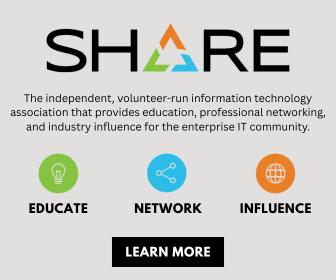In Memory of A. Harry Williams, Past SHARE President
SHARE President, Art Gutowski, has shared the news of the sudden passing of A. Harry Williams, who served as SHARE President from 2016-2018
Harry was a dedicated and longtime member of the SHARE community. His commitment to SHARE spanned over three decades, beginning in 1992 when he first volunteered with the organization. Over the years, he held numerous leadership roles — including program manager, vice president, treasurer, and numerous director and committee roles — before being elected president.
He brought a collaborative presence to every role he served, and his leadership helped guide SHARE through important transitions. Even after his presidency, he remained a valued voice in the SHARE community. He retired in 2024 from Marist College, where he most recently served as Chief Technology Officer.
Harry’s contributions to SHARE and to the broader mainframe and enterprise IT communities were significant — as were the warmth, generosity, and kindness he brought to his professional relationships. He will be deeply missed.
Rocket Software Unveils Innovations to Scale IT Impact Through Resilience, Automation, and AI-Powered Agility
Rocket Software has announced powerful new innovations to its Skills and Efficiency solutions, designed to help enterprises scale IT operations, close the IT skills gap and improve developer experience with intelligence and precision.
New product features include automation, productivity-focused tools, and optional AI-driven capabilities, supporting faster development, stronger system performance, and greater IT resilience without adding layers of complexity and risk. By making it easier for developers and infrastructure teams to work more efficiently, the company continues to support businesses in their IT modernization initiatives and transformation journeys.
These latest innovations from Rocket Software empower customers to:
- Boost developer efficiency by cutting task time from hours to minutes and accelerating new developer ramp-up from months to weeks.
- Improve system performance through AI-driven monitoring and anomaly detection for greater reliability across mainframe environments.
- Reduce IT workload with self-service automation to decrease ticket volume by up to 16%, all while maintaining compliance and security.
- Strengthen resilience with advanced, point-in-time data recovery that minimizes downtime and protects mission-critical systems.
According to Rocket Software, boosting resiliency and agility in mission-critical systems is a strategic imperative for today’s organizations that face shifting customer expectations, ongoing talent shortages, and complex hybrid IT environments.
Many of these organizations are turning to AI, automation, and other emerging technologies to meet these challenges. According to McKinsey, companies that successfully adopt agile practices can achieve up to 30% gains in efficiency, customer satisfaction, employee engagement, and overall performance. And with IT downtime costing more than $5 million per hour in high-risk industries, strengthening infrastructure resilience is now a critical need.
“IT teams are facing unprecedented demands to deliver more while balancing innovation with operational resilience,” said Phil Buckellew, President, Infrastructure Modernization Business Unit at Rocket Software. “These advancements directly address today’s critical needs – closing the IT skills gap, improving operational efficiency, and enabling modernization without disruption. By aligning cutting-edge technology with business goals, we empower IT leaders to simplify their operations, accelerate business outcomes, and future-proof their organizations, without additional risk.”
“One of the most pressing challenges facing enterprise IT teams today is the ability to address the IT skills gap while modernizing core systems and scaling operations,” said Stephen Elliot, Group Vice President, I&O, Cloud Operations, and DevOps, IDC. “AI is a powerful tool that allows IT to effectively align itself to the business by delivering greater insights and efficiency.”
Rocket Software’s product development efforts focus on supporting IT modernization while helping minimize potential disruption. The latest updates are aimed at providing practical improvements for both developers and infrastructure teams, with new optional features that include:
- Rocket® TMON™: Proactively identifies mainframe performance issues and anomalies before they impact operations using AI-powered analytics, machine learning, and KPI measurement to proactively identify performance issues and anomalies before they impact operations.
- Rocket® Zena™: Empowers non-technical users to automate processes independently, resulting in reduced reliance on IT intervention.
- Rocket® EDX: Makes document management and search faster and easier with natural language input, done via voice or text.
- Rocket® Rapid Data Recovery: Reduces downtime through single point in time data recovery.
- Rocket® MultiValue Developer Assistant: Streamlines the generation, autocompletion, and explanation of MV BASIC code, speeding up time to productivity for new developers from months to weeks.
- Rocket® Uniface® Developer Assistant : Helps users navigate Uniface documentation, learn the platform faster, generate and explain ProcScript code, and enhance code clarity with comments and plain-language explanations.
Source: Rocket Software, Inc
2025 IBM X-Force Threat Index: Large-Scale Credential Theft Escalates, Threat Actors Pivot to Stealthier Tactics
IBM has just released its 2025 X-Force Threat Intelligence Index, revealing that cybercriminals are increasingly adopting stealthier tactics, with credential theft rising sharply while ransomware attacks on enterprises have declined. A notable 84% increase in phishing emails delivering infostealers was observed in 2024, making identity theft attacks more scalable.
Other key findings in the 2025 report include:
- Critical infrastructure organizations accounted for 70% of all attacks that IBM X-Force responded to last year, with more than one quarter of these attacks caused by vulnerability exploitation.
- More cybercriminals opted to steal data (18%) than encrypt it (11%) as advanced detection technologies and increased law enforcement efforts pressure cybercriminals to adopt faster exit paths.
- Nearly one in three incidents observed in 2024 resulted in credential theft, as attackers invest in multiple pathways to quickly access, exfiltrate and monetize login information.
The report finds that legacy technology and slow patching are ongoing challenges, especially in critical infrastructure sectors, where more than a quarter of attacks were linked to unpatched vulnerabilities.
In 2024, IBM X-Force observed an uptick in phishing emails delivering infostealers and early data for 2025 reveals an even greater increase of 180% compared to 2023. This upward trend fueling follow-on account takeovers may be attributed to attackers leveraging AI to create phishing emails at scale.
Ransomware attacks decreased, partly due to international takedowns of major malware botnets. Cybercriminals are now turning to more decentralized, lower-risk models, using new and short-lived malware.
The report also notes a rise in AI threats, with increased efforts to exploit vulnerabilities in AI technologies. Additionally, Asia and North America experienced the highest attack volumes, and the manufacturing sector continued to be the most targeted by ransomware. Finally, the report found that many Linux systems were not adequately patched, leaving them vulnerable to ransomware families that now support both Windows and Linux.
- Download a copy of the 2025 IBM X-Force Threat Intelligence Index.
- Read more about the report’s top findings in this IBM blog.
Source: IBM





0 Comments